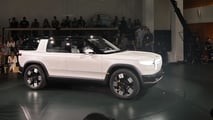The Rivian R1T pickup truck made waves when it launched in late 2021, proving that electric vehicles could be both rugged and desirable. Its success paved the way and arguably accelerated the arrival of competitors like the Ford F-150 Lightning, Tesla Cybertruck, and Chevy Silverado EV. Following up on the R1T’s initial impact, Rivian introduced the R1S SUV, further cementing its position in the EV market. However, with starting prices around $70,000 and $75,000 respectively for the R1T and R1S, these models cater to a premium segment, limiting their broader market reach.
 Front view of the Rivian R1T electric pickup truck, showcasing its distinctive headlight design and robust stance.
Front view of the Rivian R1T electric pickup truck, showcasing its distinctive headlight design and robust stance.
To truly expand and compete in the rapidly growing EV landscape, Rivian needs a more accessible, mass-market model. This is where the highly anticipated Rivian R2 comes into play. The official unveiling of the Rivian R2, alongside a surprise preview of the smaller R3, in March sparked considerable excitement. Rivian announced a target starting price of approximately $45,000 for the R2. This price point is strategically aimed to compete directly with more affordable EVs from Tesla, Chevrolet, and the Hyundai/Kia group, marking Rivian’s serious intent to capture a larger share of the electric SUV market.
With the Rivian R2’s projected launch still roughly two years away in 2026, Rivian is actively engaging potential buyers to refine its market strategy. Recent reports indicate that Rivian has initiated customer surveys, appearing on platforms like Rivian forums and subreddits, to gauge consumer preferences and price sensitivity for the R2. It’s crucial to understand that these surveys are not definitive price announcements or feature confirmations. Instead, they represent a common industry practice of A/B testing, designed to understand what features and range options resonate most with buyers at different price points.
These surveys present different combinations of features, battery ranges, and pricing structures to participants. For example, one survey respondent might be presented with a hypothetical Rivian R2 configuration featuring a single rear-wheel-drive motor, an estimated 250 miles of range, and a 0-60 mph acceleration time of 5.5 seconds. Another participant could see an alternative R2 configuration, still with a single rear-wheel-drive motor, but offering an extended 350-mile range, albeit with a slightly slower 0-60 mph time of 7.5 seconds. Interestingly, despite the varying feature sets, both of these example configurations were presented with price ranges between $57,000 and $61,000 in reported surveys.
 Side profile of the Rivian R2 electric SUV, highlighting its compact dimensions and modern design elements.
Side profile of the Rivian R2 electric SUV, highlighting its compact dimensions and modern design elements.
This type of market research is invaluable for automakers. In the example scenarios above, Rivian can analyze survey responses to determine if consumers prioritize longer driving range over quicker acceleration, or vice versa, within a given price bracket. Beyond range and performance, Rivian’s surveys are also exploring user preferences for practical aspects such as charging port locations, assessing whether owners have distinct needs for home versus public charging scenarios. Survey options have included front and rear charging port placements on both the driver and passenger sides of the vehicle.
Further reports from online forums and communities have revealed a broader spectrum of hypothetical Rivian R2 trims and price points presented in these surveys. The table below summarizes some of these reported configurations:
| Drive System | Driving Range (Miles) | Acceleration (0-60 mph) | Cost |
|---|---|---|---|
| Tri-Motor AWD | 300 | 2.5 seconds | $65,000-$69,000 |
| Tri-Motor AWD | 325 | 4.5 seconds | $57,000-$61,000 |
| Tri-Motor AWD | 275 | 5.5 seconds | $43,500 |
| Dual-Motor AWD | 250 | 3.5 seconds | $65,000-$69,000 |
| Dual-Motor AWD | 350 | 3.5 seconds | $53,000-$57,000 |
| Single-Motor RWD | 325 | 3.5 seconds | $55,000 |
| Single-Motor RWD | 335 | 6.5 seconds | $49,000-$53,000 |
| Single-Motor RWD | 250 | 7.5 seconds | $49,000-$53,000 |
These varied price points and feature combinations in the surveys indicate that while Rivian aims for a starting price around $45,000 for the R2, the final pricing structure could be more nuanced, depending on chosen trims, battery options, and features. The surveys suggest that higher-performance or longer-range versions of the R2 could potentially reach price points closer to or even exceeding $60,000.
 Rear three-quarter view of the Rivian R2, showcasing its taillight design and spacious cargo area.
Rear three-quarter view of the Rivian R2, showcasing its taillight design and spacious cargo area.
As Rivian progresses towards the R2’s 2026 launch, the data gathered from these surveys will be instrumental in shaping the final Rivian R2 Pricing strategy and trim levels. For potential buyers eagerly awaiting a more affordable Rivian EV, monitoring official announcements and further news regarding the R2 pricing and configuration will be crucial in the coming months and years. The Rivian R2 represents a pivotal step for the company, aiming to bring Rivian’s innovative electric vehicles to a broader audience.